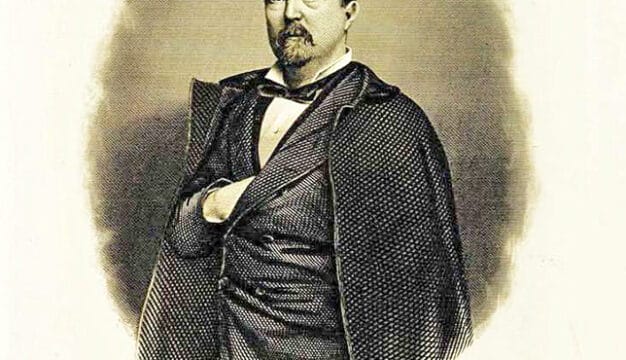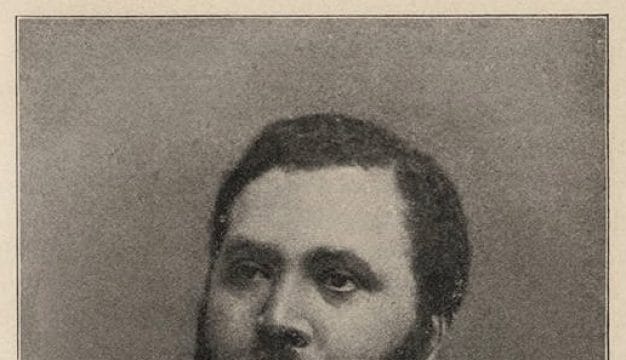Arthur Davis Shores
Long before marches and demonstrations made the civil rights movement a feature of nightly newscasts, attorney Arthur Shores (1904-1996) worked for racial equality, despite threats and violence. Shores was one of the first and most successful Black attorneys in Alabama, whose career defending civil rights began in the 1930s and continued until his death in 1996. His most notable case was representing Autherine Lucy, a Black woman whose admission to the University of Alabama in 1955 was fought by the white establishment.
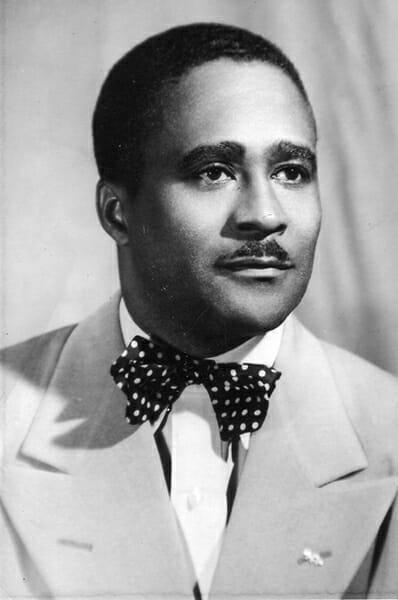 Arthur Shores
Shores was born on September 25, 1904, in the mining town of Wenonah, in Jefferson County. His parents were Richard and Pauline Shores, and he was the oldest of nine children. Shores had a middle-class upbringing and was fortunate to attend a segregated high school run by Tennessee Coal, Iron and Railroad Company (TCI) for the children of its employees, which was vastly superior to the schools that most Black children attended. Shores attended the school until the seventh grade, when school officials discovered that his father was not employed by TCI, but instead worked as a building contractor. Because there were no other high schools in Jefferson County that accepted Black students, Shores gave a fictitious address and registered at Industrial High School within the city of Birmingham and graduated in 1922. At the time, there were few institutions of higher education in the state that would admit Black students, so Shores applied to Talladega College, earning a teaching degree in 1927.
Arthur Shores
Shores was born on September 25, 1904, in the mining town of Wenonah, in Jefferson County. His parents were Richard and Pauline Shores, and he was the oldest of nine children. Shores had a middle-class upbringing and was fortunate to attend a segregated high school run by Tennessee Coal, Iron and Railroad Company (TCI) for the children of its employees, which was vastly superior to the schools that most Black children attended. Shores attended the school until the seventh grade, when school officials discovered that his father was not employed by TCI, but instead worked as a building contractor. Because there were no other high schools in Jefferson County that accepted Black students, Shores gave a fictitious address and registered at Industrial High School within the city of Birmingham and graduated in 1922. At the time, there were few institutions of higher education in the state that would admit Black students, so Shores applied to Talladega College, earning a teaching degree in 1927.
Since childhood, Shores had dreamed of becoming an attorney, but few institutions granted law degrees to Black students. He applied to the University of Kansas and was admitted to its law program in 1934. Because of the expense of earning a law degree, Shores continued teaching during the school year, and attended classes in Kansas during the summer. Eager to complete his education and begin practicing law, and aware that continuing his education in Kansas would take a number of years, Shores enrolled in LaSalle Extension University and was able to complete his education much more quickly. He passed the Alabama Bar examination, considered at the time to be one of the most difficult in the nation, in 1937.
Few Black attorneys worked in Alabama during this period, and they generally performed the background work for trial cases and then handed it over to a white attorney who would actually try the case in court. This arrangement never satisfied Shores, and he became the first Black attorney in the state to represent his own clients in court. Most of his early cases involved unpaid debts and divorces, but in 1939, Shores made his career by successfully trying a police brutality case in which a white Birmingham police officer was convicted of assaulting Black labor leader Will Hall.
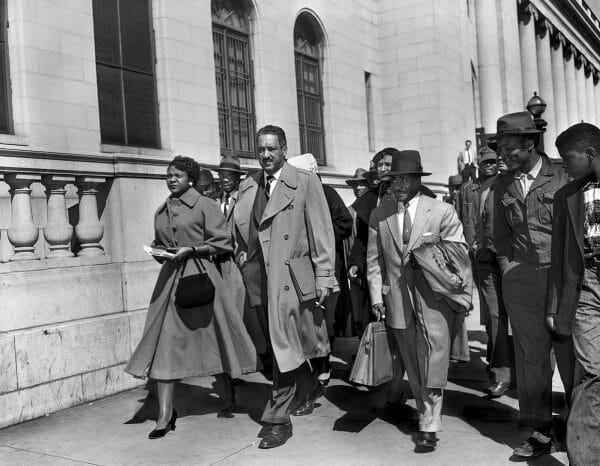 Autherine Lucy, Thurgood Marshall, and Arthur Shores
At the time of the Hall trial, Shores was already affiliated with the National Association for the Advancement of Colored People (NAACP), which he joined in 1938. After his success with the Hall case, the NAACP was sufficiently impressed with Shores to make him an integral part of their civil rights work in the South, and he became the organization’s most prolific attorney in the region. For the remainder of his career, Shores worked with a team of nationally recognized attorneys who were experts in the field of civil rights, including future Supreme Court Justice Thurgood Marshall.
Autherine Lucy, Thurgood Marshall, and Arthur Shores
At the time of the Hall trial, Shores was already affiliated with the National Association for the Advancement of Colored People (NAACP), which he joined in 1938. After his success with the Hall case, the NAACP was sufficiently impressed with Shores to make him an integral part of their civil rights work in the South, and he became the organization’s most prolific attorney in the region. For the remainder of his career, Shores worked with a team of nationally recognized attorneys who were experts in the field of civil rights, including future Supreme Court Justice Thurgood Marshall.
In 1938, Shores married Theodora Warren, a former teaching colleague, and they had two daughters. Shores had numerous investments and business ventures in addition to his thriving law practice, and the Shores family eventually became considerably wealthy.
In 1955, Shores took on what would become a landmark case, when he represented Autherine Lucy, a Black woman who had been admitted to the all-white University of Alabama and then denied admission when the institution belatedly realized its mistake in admitting a Black woman. Shores served as the local attorney on the case, which was handled by the NAACP. In 1955, the organization won a ruling that the university could not deny Lucy’s admission on the basis of her race, which was upheld by the U.S. Supreme Court that October. The following February, Lucy registered for classes, but on her third day, a mob assembled to prevent her from attending. University officials suspended Lucy until they could make adequate provisions for her safety, a disingenuous strategy that Shores saw as a thin attempt to disguise their own bigotry. Shores and the NAACP filed a daring suit charging the university with conspiracy and arguing, in essence, that officials conspired with the mob to prevent Lucy from attending classes. In response to the charges, the university promptly expelled Lucy, on the basis that her suit “slandered” the institution.
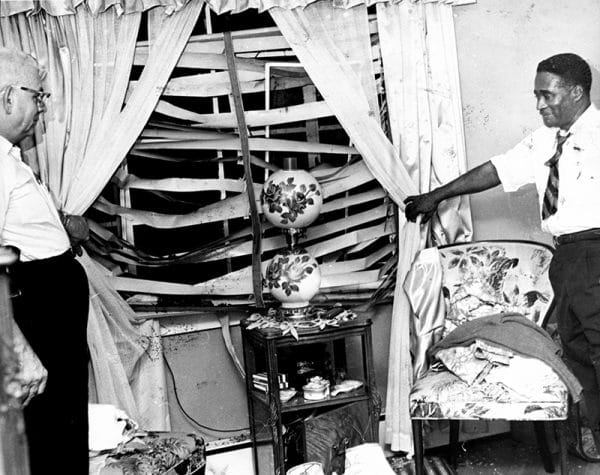 Arthur Shores
After the Lucy case, Shores became a constant presence in civil rights litigation in Alabama. He represented the more than 3,000 participants who were arrested during demonstrations as part of the Birmingham Campaign in 1963, earning notoriety that sometimes put his life in danger. Shortly after the demonstrations, an explosive device was discovered and deactivated near his home, located in a part of Birmingham that had become known as “Dynamite Hill.” In August 1963, a bomb did explode at his home, collapsing the garage and gouging a deep hole in the driveway. Days later, another bomb blew off the front door, and his family was plagued by threatening letters and phone calls.
Arthur Shores
After the Lucy case, Shores became a constant presence in civil rights litigation in Alabama. He represented the more than 3,000 participants who were arrested during demonstrations as part of the Birmingham Campaign in 1963, earning notoriety that sometimes put his life in danger. Shortly after the demonstrations, an explosive device was discovered and deactivated near his home, located in a part of Birmingham that had become known as “Dynamite Hill.” In August 1963, a bomb did explode at his home, collapsing the garage and gouging a deep hole in the driveway. Days later, another bomb blew off the front door, and his family was plagued by threatening letters and phone calls.
Change came to Birmingham, albeit slowly. In 1968, Shores became the first African American appointed to the Birmingham City Council, a position he held until 1978. The appointment garnered national attention, coming as it did in a city that only a few years earlier was known as one of the most segregated in the nation. In 1975, Shores was awarded an honorary degree from the University of Alabama at Birmingham.
In Birmingham, where segregationists once dynamited homes with impunity, Shores is now remembered admiringly for his role in bridging the gap between the two races. Arthur Shores died on December 16, 1996, at the age of 92.
Additional Resources
Cochran, Lynda Dempsey. “Arthur Davis Shores: Advocate for Freedom.” Master’s thesis, Georgia Southern College, 1977.
